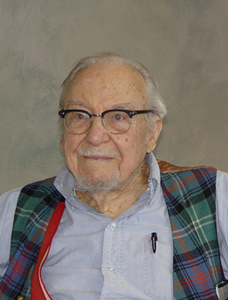

Dr. Samuel Miller, 94, of Abingdon, was a junior in high school when the stock market took its fatal tumble in 1929.
*** Published: March 22, 2009 in the Bristol (Va.) Herald Courier. ***
ABINGDON, Va. – Those who lived through the first one believe the United States is entering another Great Depression, and it will take community -- not just government action -- to get us out.
"We are in a depression," Donald Preston, 78, of Abingdon, said Saturday as part of a group discussion at the Abingdon Senior Center. "We're going to have hyper-inflation, and that is going to wipe out people."
Gathered as part of this year's Big Read project, local residents who lived through the 1930s shared their Depression-era memories and offered opinions on what should be done now.
This year's Big Read book is The Heart Is a Lonely Hunter by Carson McCullers, which is set in a Depression-era mill town.
Mimi Rockwell, 75, who participated in Saturday's discussion, said people today strive so hard to accumulate material things for their own sake, they've let community go. But to get through another Depression, she said, people will have to develop community once again.
"I think the Depression that we're entering ... is going to be a big slap in the side of the head of our young people, but they're innovative people," Rockwell said. "Anyone who can come up with all these gadgets and games and things, they're going to be able to come up with solutions for whatever problems they have."
Preston said a simple change in attitude can help a lot of people cope. Most families have enough clothing to last five or 10 years, he said, and even if someone loses a job in a two-income family, they still have a means of support. Most families used to live on just one income to begin with, he said.
"We had plenty to eat; we never went hungry," Preston said of the Depression, when his family, despite living in a town, raised chickens and planted a garden to provide their own food. He said they took care of the things they had and made them last. They also relied on a strong set of values.
"That's the difference between the Great Depression and now," Preston said. "We think we need money to have fun, education, church and work, and we don't."
Dr. Samuel Miller, 94, of Abingdon, was a junior in high school when the stock market took its fatal tumble in 1929. It was a time, he said, when his family lived with no phone, car or electric lights but a quarter-pound candy bar cost only a nickel and 20 cents worth of beef would feed a family of eight.
The thing he remembers most, he said, is the quiet in the country – where on a frosty morning he could hear every car that crossed a bridge over the river three miles away. Farther away was the chair factory, but he said he had no trouble hearing the 12 o'clock whistle – and no trouble hearing neighbors yodeling half a mile away.
"Who's going to hear a person yodeling half a mile away anymore?" Miller said. "Even if they yodeled, it would be drowned out."
Once the Depression began, they said, they remembered the hobos who came – sometimes a hundred on one train – looking for work.
"Hobos from the railroad, they would ask if they could break up some coal or chop wood or whatever. ... They would work if you'd give them some food," said Don Ault, 73, of Meadowview. "If you didn't consent to that, you'd better have everything tied down."
The hobos would make a mark on the post to let those who followed know what to expect from a particular house, he added.
Ault recalls, as a child, throwing snowballs at the fireman on a passing train, who would throw coal back in retaliation; that coal, Ault said, helped his family heat their home.
In those days there was no unemployment insurance, Ault said, but many rural residents still had the means to raise their own food. "In the big city is where it really was ugly, because so many people tried to get by with so little stuff," Ault said. "It was a lot less severe, I think, for people who had the means to provide food."
The government programs that finally put people to work, under the Works Progress Administration, had a huge impact because they allowed men to receive a paycheck again – and hold their heads up for the first time in years.
Still, Preston said, people shouldn't expect the government to pull the nation out of a Depression because the government can't produce something from nothing – and massive spending on the taxpayer's dime for the benefit of certain groups will only make the problem worse.
Instead, he said, people should start working together to pull themselves – and the nation – out of depression.